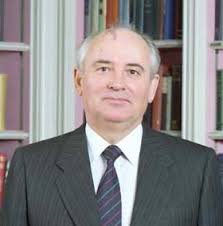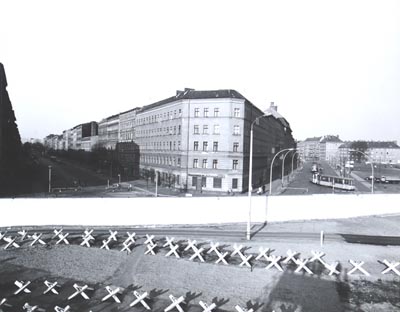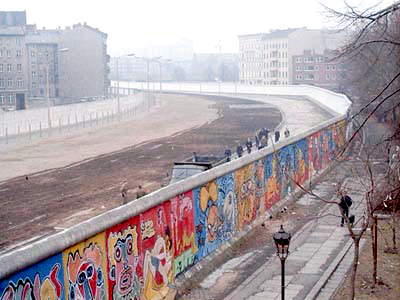
Mikhail Gorbachev was instrumental in the fall of the Berlin wall and the end of the cold war.

"The Anti Fascist Protection Barrier".

The Berlin wall was used as a canvas for many artists.

Fall of the Soviet Union
The cold war ended by the collapse of one of its contenders the USSR. The reform process initiated by Gorbachev in 1985 precipitated a dynamic that finished sweeping away the very existence of the state founded by Lenin.In the midst of a deep economic crisis, with a population thanks to glasnost increasingly aware of the cruelty and corruption that characterized the Soviet dictatorship, nationalism came to act as uncontrollable factor of disintegration of the Soviet state, heir of the tsarist empire.
The centrifugal movement began in the Baltic republics, which in the fall of 1989 made clear its intention to sever ties with a state that had joined as victims of the Covenant signed Molotov and Ribbentrop in 1939 same nationalism appeared in Caucasian republics, fueled by the confrontation between Armenians and Azeris in Nagorno-Karabakh in 1988.
When in February 1990, Gorbachev stepped forward in his perestroika renouncing the political monopoly of the CPSU and partly calling multiparty elections, he found that in Lithuania, Latvia, Estonia and Moldova gained independence political forces. Lithuania declared independence immediately, setting a precedent for the other republics that formed the USSR.
In July 1990, the XXVIII Congress of the CPSU noted the rapid decline of the party that had bonded to the Soviet state for decades. The minister of foreign affairs Eduard Shevardnadze resigned in December 1990 in protest at what he saw as an imminent coup that would return the country to the era of Brezhnev.
Cornered between conservative communist forces seeking a lap down in the reform process and the reformist and nationalist forces, Gorbachev tried to negotiate a union of sovereign states to rebuild on new foundations of greater national freedom the former USSR. However, orthodox communists tried to impose a solution strength, August 19, 1991, Gorbachev was abducted from his summer residence in the Black Sea and a group of communist hardliners became the head of a military coup. The lack of unity in the army and the actions of popular protest in Moscow foiled the coup. It was the time of Boris Yeltsin, who took over the protest against the coup in the capital.
The failed coup was like the alarm that precipitated the headlong flight of all republics of Soviet Union that no longer interested. While the CPSU, the political instrument that had bonded to the USSR, was prohibited.
The December 1, 1991, 90.3% of Ukrainians voted for independence. 8 this month, in an improvised solution on the fly, the leaders of Russia, Ukraine and Belarus, Boris Yeltsin, Leonid Kravchuk and Stanislav Shushkevich, were found near Brest-Litovsk and agreed to the so-called Declaration of Belovezhskaya Pusha : three Slavic republics left the USSR and formed a so-called Commonwealth of Independent States . On 21 December, at a meeting Alma Ata, eight of the twelve remaining republics of the Soviet Union (Estonia, Latvia, Lithuania and Moldova had opted for outright independence) they followed the example of Russia, Ukraine and Belarus.
Helpless and abandoned by almost everyone, Gorbachev resigned as president of the USSR on 25 December 1991. The Soviet red flag was lowered at the Kremlin in Moscow. The Russian flag replaced. Russia took over from the Soviet Union on the international scene: the embassies, the permanent seat on the Security Council, control of Soviet nuclear weapons ... But the bipolar world of the Cold War had come to an end. Announced by President Bush in early 1991, the birth of a "new world order" .
